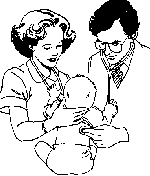
|
|||||
|---|---|---|---|---|---|

|
|||||
by Dr. Michael Mitchell, Pediatrician

|


A Parent's Guide to Children's Medicines |
In the early years of life, even the healthiest child might require medication of some kind. We encourage parents to be as well-informed as possible about the care and medicines their pediatricians are prescribing.
Parents should be comfortable questioning their doctors and pharmacists about the do's and don'ts of medicating their children. This article outlines twenty essential questions and why they are important.
☐ 1. What is the exact dose of the medication?
ANSWER: This must be discussed whenever medication is prescribed. You should get this information directly from your pediatrician or pharmacist.
☐ 2. Do I have to refrigerate the medicine?
ANSWER: Most liquid forms of medicine require refrigeration to keep their potency. Ask your pharmacist.
☐ 3. When does my child have to take this drug? Three times a day or exactly every eight hours?
ANSWER: If you do not have to wake your child in the middle of the night, it is easier for both of you. Some medications do not need to be given exactly at the same intervals. It is far easier to give the medication three times a day - after meals - than exactly every eight hours. Ask your doctor.
☐ 4. Can my child take this medicine simultaneously with other prescriptions or over-the-counter drugs?
ANSWER: Ask your pharmacist. You don't want to give two medicines that together can have adverse side effects.

Dreambaby Medi Guard Medicine Lock Box |
☐ 5. Should this drug be administered before, after or with meals?
ANSWER: This is very important because you want the medicine to have the most potency and the least side effects. Find out from your doctor if the medicine should be taken on an empty stomach, after eating, or with meals.
☐ 6. Can I give this drug to my child with milk or juice?
ANSWER: Some medicines taste terrible so it's easier to administer them with juice. However, some medicines lose their potency and don't work when mixed with milk. Ask your pharmacist.
☐ 7. Are there any tricks for administering this medicine?
ANSWER: Ask if you can hide it in food or liquid. You can also try using a syringe and squirting it toward the side of your child's mouth.
☐ 8. For how long should my child take this medicine?
ANSWER: Ask specifically if you should finish the whole bottle, or give it for a specific number of days. It is imperative that you get explicit instructions as to the length of time the medicine should be taken.
☐ 9. If my child is better in a couple of days, should I stop the medicine?
ANSWER: Report your child's status to the pediatrician. Stop the medication only if your doctor tells you to. Most medicines should be given for the entire recommend course.
☐ 10. How many days should I wait before reporting to the pediatrician that the medicine is not working?
ANSWER: If there is no improvement within 2-3 days, call your doctor. Either the medicine does not work on your child or something else is going on that needs attention.

|

Mary's Clover: A Story about Medication Safety |
☐ 11. If my child vomits up the dose, do I immediately give another dose?
ANSWER: Most doses should be repeated if your child expels most of the medicine. An extra dose will not usually hurt your child, but always consult with your physician before administering a second dose.
☐ 12. What happens if I mistakenly give two doses with a short time?
ANSWER: Most likely nothing. Usually, a second dose is not harmful, but ask your doctor.
☐ 13. What happens if I forget to give one of the doses?
ANSWER: Nothing, and you can probably give the dose sometime during the remainder of the day. Again, ask your physician how to make up for the missing dose.
☐ 14. How do I give my child afternoon medications during school?
ANSWER: Usually, you can give a small bottle to the nurse top administer. There are also medications that only have to be given once or twice a day. Ask your doctor if any of these can be used in order to eliminate the worry of taking medicine in school.
☐ 15. What side effects can this drug cause? Which ones should I report, and which can be disregarded?
ANSWER: Ask your pediatrician if the medication will cause stomach ache, rash or other problems. Also, find out if you should discontinue the medicine if the side effects persist, and for how long they last.
☐ 16. Is the prescription renewable?
ANSWER: Usually the doctor will tell you this. Sometimes refills are given for non-antibiotic medicines. Parents should not take it upon themselves to refill an antibiotic because if the child only has a virus, he will be taking unnecessary medicine.

Fridge Safe Box Locker |
☐ 17. If I don't use all the medicine, can I save it for the future?
ANSWER: Liquids should not be saved. They last only about two weeks with refrigeration. Chewables and pills, on the other hand, have a much longer shelf life. Ask your pharmacist.
☐ 18. Over what period of time will the medicine lose its potency?
ANSWER: Your pharmacist can read the insert and provide this information. Liquids usually last about two weeks, chewables and capsules about two years or longer.
☐ 19. Is the medicine available in a chewable form?
ANSWER: This could make your life a lot easier because children, especially older ones, do better with chewables than liquids and they are easier to administer. However, chewables can be more expensive. Ask your pharmacist.
☐ 20. Is this medicine available in a less expensive, generic form? If so, is the less expensive remedy as effective?
ANSWER: If the generic brands work as well as the brand name, you could save yourself a lot of money.
(Copyright © 1992) Natural Child Care Company, Inc., Armonk, N.Y. - reprinted with permission.
Disclaimer: The content provided above is not intended as a substitute for medical care; rather, it is intended to facilitate communication between you and your health care provider. Users are advised all decisions regarding the diagnosis and treatment of a medical condition, including decisions regarding drug therapy, are complex medical decisions requiring the independent and informed judgment of an appropriate health care professional. All specific questions regarding the treatment and care of a medical condition should be posed to your own professional health care provider.
This article compliments of Born to Love.
Send questions, comments, and suggestions to: catherine@borntolove.com
Born to Love articles are written by Catherine McDiarmid-Watt
Born to Love is a participant in the Amazon Services LLC Associates Program, an affiliate advertising program designed to provide a means for sites to earn advertising fees.
NOTE: All logos, company names, brands, images, trademarks and other intellectual property are the property of their respective owners.
Born to Love is a participant in the eBay Partner Network, an affiliate advertising program designed to provide a means for sites to earn advertising fees by advertising and linking to eBay.com.
Copyright © 1978 - BorntoLove.com - All Rights Reserved.
Last updated - April 5, 2024